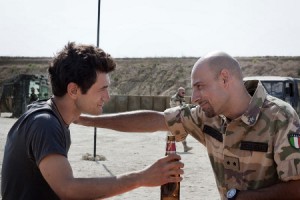italian film festival
 20 Cigarettes is a confronting Italian film based on writer/director Aureliao Amadei’s experiences in Iraq in 2003. At the age of 28, Aureliao travelled to Iraq to work on a film about the Italian military “peace mission”. Here he was immediately thrown into a world of violence – even before he was able to finish a packet of cigarettes.
20 Cigarettes is a confronting Italian film based on writer/director Aureliao Amadei’s experiences in Iraq in 2003. At the age of 28, Aureliao travelled to Iraq to work on a film about the Italian military “peace mission”. Here he was immediately thrown into a world of violence – even before he was able to finish a packet of cigarettes.
Aureliao Amadei talks about his thoughts on the Italian film industry and his vision and hopes for the film which is screening at the 12th Lavazza Italian Film Festival.
Was it difficult to break into the Italian film industry as a first time feature filmmaker?
I had to be blown up by a bomb! But jokes aside, it was difficult but I had the luck to find very sensitive people who’ve been with me all along, so I managed to communicate my urgency for this film to the whole cast and crew. Since that time, it’s as though all the people who have worked with me on this film, including festival directors, have felt my same urgency and the need to make 20 CIGARETTES.
Who are your cinematic influences? What sort of style were you hoping to achieve on this film?
I will talk about my favourite directors, but before doing so, I need to say that for this film I really wasn’t inspired by anything that I’d seen before. That wouldn’t have been honest to all those people who lost their sons, their husbands and their fathers in the attack. I really faced this challenge on pure gut instincts. My cinematic influences have nothing to do with this film. Jean-Pierre Jeunet is one of my favourite filmmakers in the world, but his films have practically nothing to do with mine. Likewise for the style, I didn’t want to look to anything that had already been seen. What we focused on was being able to shift from different styles very easily and quickly, so the film really changes, just as life would do. The minute before a tragedy occurs, you’re very likely to be living in a comedy.
How much of the film is directly autobiographical? How similar are you to your ‘alter ego’?
One thing that’s important to say is that these are two very different questions. The film is completely autobiographical, and what happens in the film is completely true and really happened to me during this experience – but my alter ego wasn’t supposed to be an exposition of my personality to the world. I can point out many differences between my personality and my on-screen alter ego, but that was never the point of the film. For me, it was far more important to explain how events unfolded, then to explain how I was.
Was it important for you to incorporate humour into this tragic story?
It was vital for two reasons. One is honesty – when I lived this story, I had a lot of very funny moments. The other reason, which is more important to me, is that through this story, I wanted to tell the audience that any story, especially the ones that end up as history, have a funny side to them – even the ones that are reported as epic poems and stories of heroes. So beware, when we are told a story that is conveyed as a complete comedy or as a full-on tragedy, we are probably being lied to. And when people lie to us, there is usually a purpose.
What were you looking for in the casting process?
Having been an actor myself, I was mainly looking for quality, or what I think is quality in acting. Amoung the actors of quality that I found, I chose those who were intelligent human beings, were able to endow their characters with the many contradictions that are so well known and accepted in real life – yet so little explored in cinema. As an actor, it takes some courage to portray a contradictory character.
What is the message of the film in the end?
One of the messages that I care about the most in the movie is that human beings are all individuals and any category you want to put them in isn’t really ever reflected by reality. We live in a society that tends to make things very simple so that we easily stand on one side or the other. But real life… is never simple. In these terms I really wanted to explore what my personal responsibility or even our personal responsibilities are in war, rather than accusing this or that government or army, of what happened.
The film festival is runing on the following dates: Melbourne 14 Sep- 5 Oct, Sydney 15 Sep-5 Oct, Brisbane 5-23 Oct, Adeliade 12-30 Oct, Perth 13- 26 Oct. You can visit the Festival website for a full program: www.italianfilmfestival.com.au


